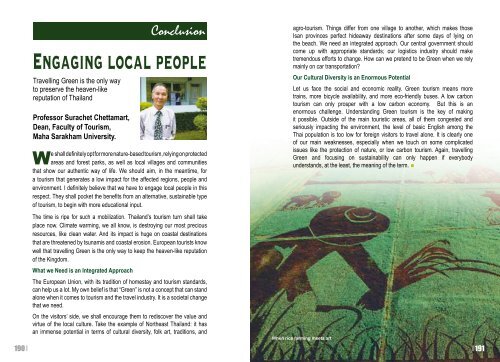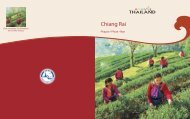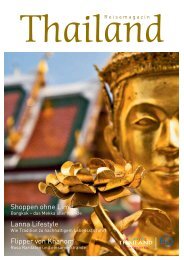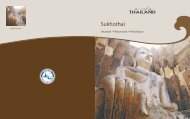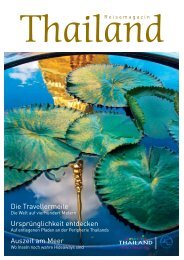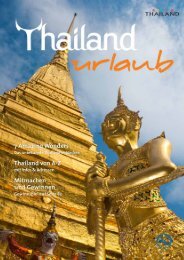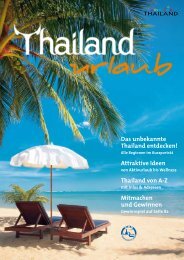chiang mai province
chiang mai province
chiang mai province
- No tags were found...
Create successful ePaper yourself
Turn your PDF publications into a flip-book with our unique Google optimized e-Paper software.
Travelling Green is the only way<br />
to preserve the heaven-like<br />
reputation of Thailand<br />
Professor Surachet Chettamart,<br />
Dean, Faculty of Tourism,<br />
Maha Sarakham University.<br />
Conclusion<br />
Engaging local people<br />
We shall definitely opt for more nature-based tourism, relying on protected<br />
areas and forest parks, as well as local villages and communities<br />
that show our authentic way of life. We should aim, in the meantime, for<br />
a tourism that generates a low impact for the affected regions, people and<br />
environment. I definitely believe that we have to engage local people in this<br />
respect. They shall pocket the benefits from an alternative, sustainable type<br />
of tourism, to begin with more educational input.<br />
The time is ripe for such a mobilization. Thailand’s tourism turn shall take<br />
place now. Climate warming, we all know, is destroying our most precious<br />
resources, like clean water. And its impact is huge on coastal destinations<br />
that are threatened by tsunamis and coastal erosion. European tourists know<br />
well that travelling Green is the only way to keep the heaven-like reputation<br />
of the Kingdom.<br />
What we Need is an Integrated Approach<br />
The European Union, with its tradition of homestay and tourism standards,<br />
can help us a lot. My own belief is that “Green” is not a concept that can stand<br />
alone when it comes to tourism and the travel industry. It is a societal change<br />
that we need.<br />
On the visitors’ side, we shall encourage them to rediscover the value and<br />
virtue of the local culture. Take the example of Northeast Thailand: it has<br />
an immense potential in terms of cultural diversity, folk art, traditions, and<br />
agro-tourism. Things differ from one village to another, which makes those<br />
Isan <strong>province</strong>s perfect hideaway destinations after some days of lying on<br />
the beach. We need an integrated approach. Our central government should<br />
come up with appropriate standards; our logistics industry should make<br />
tremendous efforts to change. How can we pretend to be Green when we rely<br />
<strong>mai</strong>nly on car transportation<br />
Our Cultural Diversity is an Enormous Potential<br />
Let us face the social and economic reality. Green tourism means more<br />
trains, more bicycle availability, and more eco-friendly buses. A low carbon<br />
tourism can only prosper with a low carbon economy. But this is an<br />
enormous challenge. Understanding Green tourism is the key of making<br />
it possible. Outside of the <strong>mai</strong>n touristic areas, all of them congested and<br />
seriously impacting the environment, the level of basic English among the<br />
Thai population is too low for foreign visitors to travel alone. It is clearly one<br />
of our <strong>mai</strong>n weaknesses, especially when we touch on some complicated<br />
issues like the protection of nature, or low carbon tourism. Again, travelling<br />
Green and focusing on sustainability can only happen if everybody<br />
understands, at the least, the meaning of the term. •<br />
When rice farming meets art<br />
190 191


